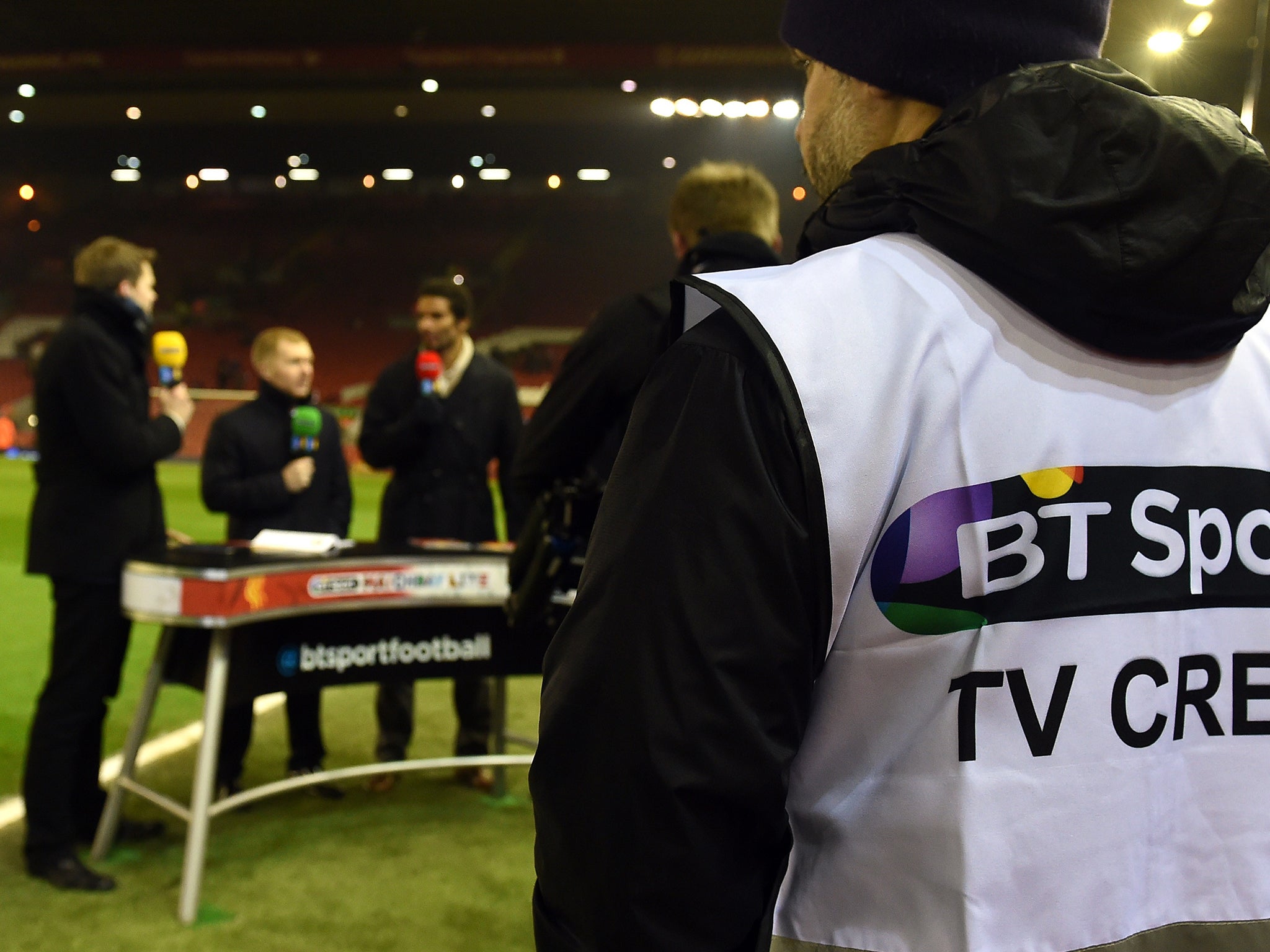BT's captain Gavin Patterson shoots and scores in a game he couldn't afford to lose
Some thought the strategy of taking on Sky in the battle to show live top-flight football and win more broadband customers was too risky. But it's a risk that has paid off handsomely for the chief executive

Your support helps us to tell the story
From reproductive rights to climate change to Big Tech, The Independent is on the ground when the story is developing. Whether it's investigating the financials of Elon Musk's pro-Trump PAC or producing our latest documentary, 'The A Word', which shines a light on the American women fighting for reproductive rights, we know how important it is to parse out the facts from the messaging.
At such a critical moment in US history, we need reporters on the ground. Your donation allows us to keep sending journalists to speak to both sides of the story.
The Independent is trusted by Americans across the entire political spectrum. And unlike many other quality news outlets, we choose not to lock Americans out of our reporting and analysis with paywalls. We believe quality journalism should be available to everyone, paid for by those who can afford it.
Your support makes all the difference.When BT revealed that it wanted to challenge Sky’s 20-year dominance of live screenings of Premier League football matches, many in the City and beyond balked and scoffed at the telecoms group’s nerve.
But BT’s bosses believed that where the previous challengers – ITV Digital, Setanta and ESPN – had all failed, they could win by offering BT Sport free to broadband customers. Because, they thought, let’s face it – everyone’s got broadband so who wouldn’t want some football thrown in for nothing?
And it seems that gamble has paid off as the BT chief executive Gavin Patterson revealed a 7 per cent increase in revenues for its consumer division in the year to the end of March, to £4.3bn, in turn helping total revenues to hit £17.8bn and group pre-tax profits to jump 12 per cent to £3.17bn.
To put those billions of pounds into context, BT added 121,000 new broadband customers in just the first three months of the year, taking its customer base to 7.7 million homes across the country and representing an impressive 49 per cent of total growth in the broadband market. It also picked up 52,000 TV customers – taking its total to 1.14 million – and won 50,000 mobile customers following a low-key launch of the service in March. More importantly, the telecoms giant beat Sky in the broadband sign-up stakes; its rival attracted 100,000.
John Petter, the chief executive for its consumer division – which Mr Patterson previously ran – summed it up recently. He said: “There were a lot of sceptics and there were a lot of people who thought we’d somewhat lost the plot in 2012 [when the football rights bid was first announced].
“But the numbers speak for themselves. The consumer business is doing better now than it has ever done. Not only are the profits growing consistently, but even before the investment in sport the profits are up.”
However, it wasn’t just the football punt that seems to have worked wonders for Mr Patterson, because an early call to roll out superfast broadband is also paying dividends, with a record 3 million people using the fibre optic service.
And any suggestions that BT has peaked could be wide of the mark too – or at least the boardroom and shareholders seem to think so – because the company spent a further £1.86bn buying the rights to the Champions League and another Premier League football package to show 42 games a season.

BT pushed Sky so hard in the bidding process, having pinched its coveted Champions League coverage, that its bitter rival was forced to spend £4.18bn to screen 126 lives games a year. That works out at £11m per game.
Its fibre optic rollout continues and trials are already under way for an even faster service of up to 500 megabytes a second, while a new, no doubt expensive, advertising campaign featuring the actor Ewan McGregor is taking over the airwaves and TV screens.
And as if that were not enough, shareholders last week approved a £12.5bn takeover of the UK’s biggest mobile phone operator, EE, giving it an instant high-street store portfolio of several hundred sites, access to one of the better mobile phone spectrums and the biggest 4G offering.
Explaining how the EE deal could lead to even bigger things, Peter Ward, a dealer at the online trading service London Capital Group, said: “The move into ‘quad play’ is the next key landmark on the road ahead, as shareholders approved the EE acquisition.”
Quad play, where a household has all four key media services – broadband, phone line, mobile and pay TV – from one supplier, is the holy grail for BT, Sky, Virgin Media and TalkTalk. It has not caught on in the UK to the same extent as in the rest of Europe, but with the rise and rise of the smartphone and the blurring of lines between mobile, TV and the internet, BT is betting on big things to come.
The only question left is: what could possibly go wrong for the once greatly mocked former state-owned behemoth? Well, BT should not be counting its chickens just yet, because as its dominance grows, so do the screams of protest from its industry competitors.
Vodafone and Sky are already questioning the company’s market share – with the former making strong appeals to the Competition and Markets Authority to put severe restrictions on the EE takeover, with the possibility of forcing BT to spin off its Openreach fibre optics business, which rents out space to rivals.
And finally, BT’s undoing could be at the hands of the British public. Not just because customers must face up to the inevitable rising broadband prices to offset the free football, but because of the risk of a Eurosceptic nation pushing for the UK to leave the European Union. BT has significant contracts in Italy, Germany, France, the Netherlands, Spain and Switzerland.
Mr Patterson’s view was unequivocal: “The EU for all its idiosyncrasies is a positive thing for business. A referendum would be bad for business and bad for BT.”
The sporting life: Patterson’s background
Gavin Patterson was appointed chief executive of BT Group in September 2013 having worked within the business for the prior nine years.
An avid Liverpool FC fan and music lover, the 47-year old joined the board in 2008.
Not your average FTSE 100 boss, Mr Patterson has been described by the press as “so handsome and well-groomed” as well as someone who might “audition for a part in a movie about Lakeland poets”.
He has a base salary of £950,000. His impressive spell at the telecoms group includes the launch of BT Infinity super-fast broadband while at the helm of BT Retail.
Prior to BT, the Cambridge University graduate spent four years at Telewest (now Virgin Media). Before that he worked for consumer goods group Procter & Gamble for nine years.
In addition to his BT role, he is a non-executive director of British Airways and a trustee of the British museum.
Subscribe to Independent Premium to bookmark this article
Want to bookmark your favourite articles and stories to read or reference later? Start your Independent Premium subscription today.
Join our commenting forum
Join thought-provoking conversations, follow other Independent readers and see their replies
Comments